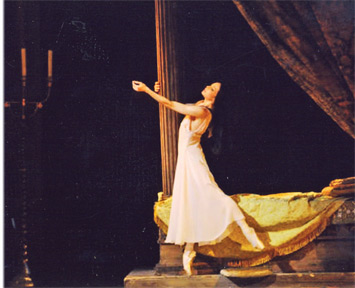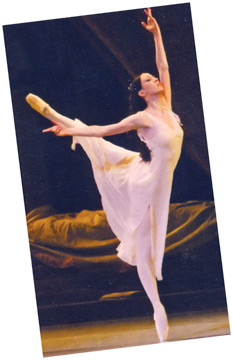|
Mariinsky Ballet goes to London:
Excitement in the air
by Gwen Herat at the Royal Opera House, Covent
Garden
Think of Mariinsky and Royal Opera House, the ravishing summer snugs
ll in her beauteous splendour. The balmy weather creates the atmosphere
and mood for the grandeur of the visiting Mariinsky magic.
When Mariinsky comes to London, it is always sensational and on such
several glorious events, I happened to be there. Romeo and Juliet was
staged at the London Opera House. This much-awaited ballet was followed
by several other classics drawing the excited Britons in their thousands
to the Covent Garden along with other visitors to London who too were
feeling the warmth of the summer season.
|

Where thou art, there will my spirit be'(GH) This quote is
not from Romeo and Juliet but from this writer's work |
The ballet company of the Mariinsky Theatre from St. Petersburg could
not have been more realistic than its followers. Apart from the young
students I saw from the Royal Ballet artistes aspiring to be tomorrow's
choreographers. They may have wanted to see the real and live Russian
works in addition to what they knew for the present. The rush, the body
language of one and all made it obvious what was expected for the
evening.
Classical dream
Not a seat left vacant except the murmer from each other as the
curtains went up to reveal a classical dream from across the oceans we
were eagerly waiting to see. At any stage, any moment, any day, the
Mariinsky never lets down its classical repertoire in their leading
classics that make Russia the citadel of classical dance.
The stage is set for this world's greatest love story where the
star-crossed lovers begin their journey to a tragic end. Their families,
the Capulets and Montagues who are deeply opposed to their union and who
are engaged in a vicious feud lead them, step by step to horrifying
consequences where Romeo and Juliet commit suicide.
Today's version, places an enhanced role on Tybalt, Julia's cousin to
highlight the Shakespearean tragedy. The emphasis helps develop hatred
for Romeo who has stolen Juliet's heart to leave Tybalt as the
frustrated Capulet. Here the choreographer has been very indifferent to
its original one, Leonide Lavrovsky.
No doubt Romeo and Juliet is the iconic 20th century ballet from
Russia where Leoide Lavrvsky was a part of the original team that went
on to develop Prokofiev's score which he especially wrote for the ballet
and which became inseparable wherever or whenever the ballet was
performed.
Romeo and Juliet is a speciality whenever Bolshoi decides to take
this masterpiece out of Russia. Yet, it was not until 1940 that
Prokofieve's score was heard in Russia and with Mariinsky dancing to
Lavrovsky's choreography, the dream-ballet was produced and its premiere
celebrated a new era in Soviet ballet and Lavrovsky became its pioneer.
But it did not stop there.
There was more in store for Lavrovsky because he was determined to
push Prokofiev's score to include mere innovative techniques that he
drew from several dance styles with varying magnificent crowd scenes
especially among the Montagues and the Capulets with soulful ‘pas de
deux'. He was a great master at expressive mime that he used to
introduce in greater realism and the ultimate result was to capture the
agonising clarity evident in the emotions of the young lovers.
It is this improvised version which the Mariinsky Ballet Theatre
upheld in its pure classical repertoire. It had maintained the
Renaissance society that Framed tragedy.
The breathtaking versatality of Diana Vishneva with the exiting
personality of her Romeo was a class by themselves. There was nothing
lacking and left for imagination. The rest of the cast were equally
equipped in their dancing prowess that has made this version of the
ballet so perfect and immaculate. The gorgeous settings and iconic
choreography could not have been better towards this spectacular marvel.
|

Diana Vishnova as Juliet in the Mariinsky
Theatre production of Romeo and Juliet
boarded at the Royal Opera House, Covent
Garden. |
Sergei Prokofiev is the only composer who maintained his musical
ideals under Russian dictatorship. He was by no means interested in the
affairs of the State. As a matter of coincidence, Stalin and he died on
the same day. His apparent brilliance took him to St. Petersburg
Conservatory when he was barely 13 years and there was no looking back
as he rose to great scales. His scores ranged from symphony, orchestral,
incidental, concerto, opera, ballet, choral, chamber, piano and vocal.
Throughout his musical career as composer all his scores were
original; nothing borrowed but influenced by Stravinsky and the Russian
School. He did step out of bounds once in a while when he composed the
First Piano Concerto which turned out to be controversial with its
violent keyboard and melodic twists. He remains one of the most
performed composers even today.
His essential works among others were, Classical Symphony (917), The
Love for Tree Oranges (1919), Violin Concerto No. 3 (1921), Violin
Concerto No. 2 (1935), Peter and the Wolf (1936) with many Pianosonatas
as well as Symphony No. 5 (1944). Among all these, Romeo and Juliet, Op.
65 (1935) stands out as his best contribution to ballet which is based
on Shakespeare's play.
It became very popular after the appearance of three orchestral
suites based on the score, followed by the strutting, Montagues and
Capulets also known as The March of the Nobles.
|

